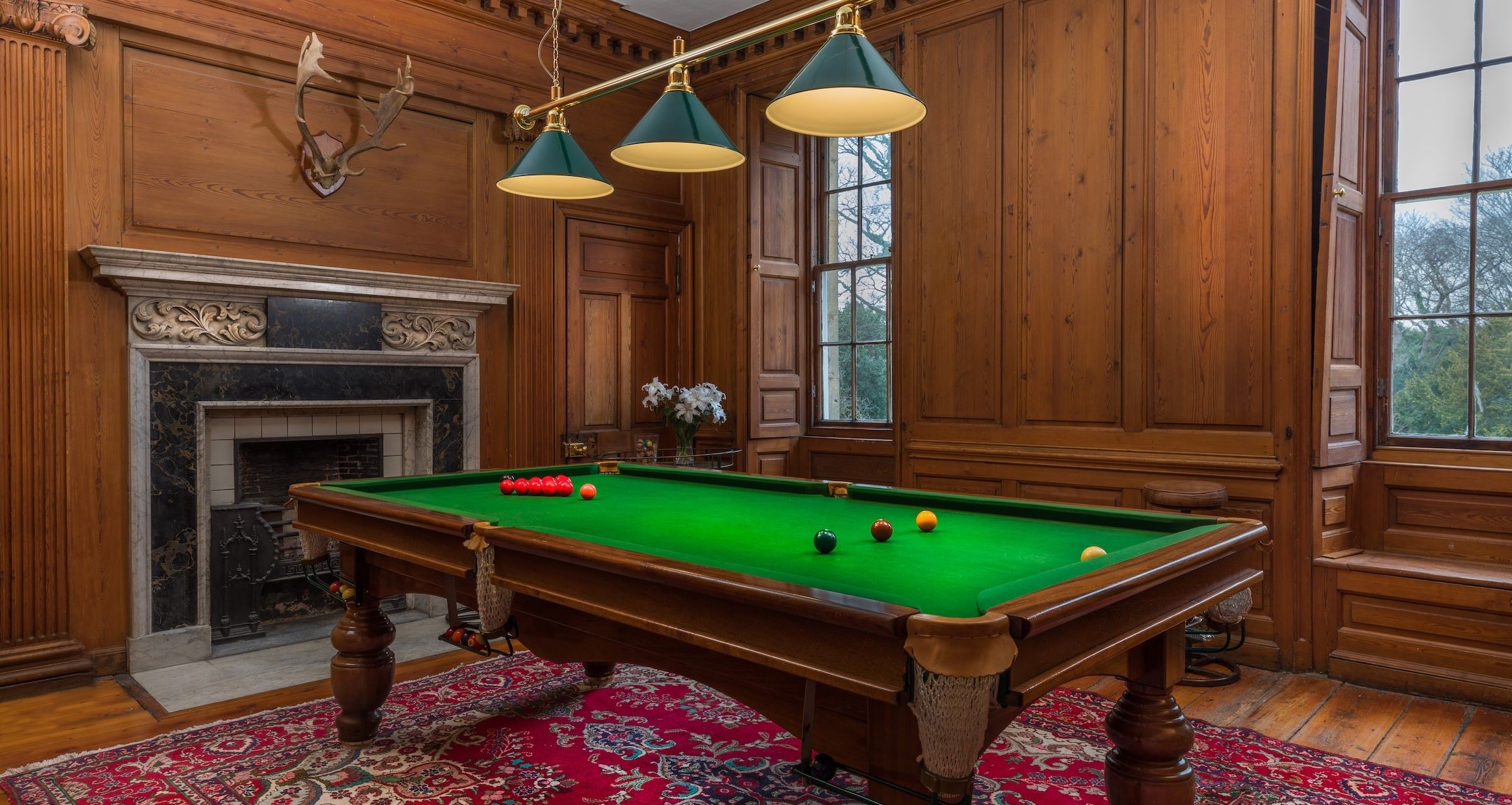
Billiards, a classic game of skill and strategy, has graced homes, bars, and clubs for centuries. While the glint of the balls and the allure of a smooth pool table can be quite enticing, one critical factor often overlooked by enthusiasts is the pool table’s room size. Imagine investing in a beautiful pool table only to discover there’s not enough space for a perfect shot! Understanding the right pool table room size isn’t just about ensuring you have enough space to play; it’s about merging functionality with comfort, creating an ambiance that complements the game, and ultimately enhancing the playing experience. Whether you’re planning a dedicated billiard room or adding a table to your multipurpose space, this guide will walk you through everything you need to know about pool table room sizes. Dive in and ensure that every shot, every move, and every moment around your pool table is nothing short of perfect.
Why is Room Size Important?
The rhythmic click of pool balls, the calculated angles of a perfect shot, the graceful arc of the cue stick—all these nuances of the game can be compromised if you don’t have the right room size. But why is this such a pivotal aspect of setting up a pool table? Let’s delve into the reasons:
- Gameplay: At the heart of billiards is the game itself. With an inadequately sized room, players might find themselves cramped against walls, making shots awkward or downright impossible. The essence of pool is freedom of movement, allowing players to align, aim, and shoot from various angles. A room that doesn’t provide ample space for this movement detracts from the game’s enjoyment and challenge.
- Safety: Beyond the game, there’s the safety of both players and the room to consider. Too close to a wall or a piece of furniture, and a player might inadvertently scratch or dent them with the backswing of the cue. There’s also the risk of players injuring themselves if they’re constantly trying to adjust to tight spaces.
- Aesthetics and Functionality: A pool table is as much a piece of furniture as it is a recreational item. In the right room, it stands as a centerpiece, accentuating the ambiance and reflecting a sense of sophistication. However, a table crammed into a too-small space can look out of place, throwing off the balance and harmony of the room. Furthermore, functionality isn’t just about the game; it’s about the space around the table, where players can comfortably stand, chat, or even spectate.
While the pool table might be the star, the room itself sets the stage. Just as a play is best enjoyed in a theater with apt acoustics and seating, a game of billiards thrives in a room tailored for it.
Standard Pool Table Sizes
Pool tables come in a variety of sizes, each designed for different spaces, skill levels, and gaming experiences. Understanding these sizes is pivotal to choosing the perfect fit for your room. Let’s dive into the various dimensions:
- 4-foot and less: These are the most miniature pool tables available, often considered novelty or toy tables. They’re perfect for children or for anyone who wants a taste of the game without dedicating too much space. Great for introducing children to the game, for casual play, or even as a decorative piece. It’s not suitable for serious gameplay or practice. Read our review of best mini pool tables here.
- Between 4 and 6-feet: Slightly larger than mini tables, these are designed for recreational play in limited spaces. They offer a more realistic gaming experience than mini tables but are still compact enough for smaller rooms. Ideal for casual players, teenagers, or those with restricted space. It’s not typically used in competitive play but provides a more genuine feel than the mini tables. Read our review of best small pool tables available in the market here.
- 6-foot: Treading the line between compact and full-sized, the 6-foot tables offer a balanced pool experience. They’re large enough for genuine gameplay but still fit well in many home settings. Suitable for both beginners and intermediate players looking for recreational play without committing to professional table sizes.
- 7-foot table: Often found in bars and pubs, these tables are recognized for their compact size while still offering a challenge for enthusiasts. Perfect for casual to semi-serious play, these tables are often used in pubs and smaller establishments.
- 8-foot table: The most common size for home enthusiasts, the 8-foot table strikes a balance between recreational and professional gameplay. It’s sizable enough for a realistic game but doesn’t command as much space as tournament tables. A favorite for homes and private clubs. It’s the preferred choice for those looking to hone their skills at home.
- 9-foot table: The cream of the crop, these tables are for the serious players. With their large size, they offer the full pool experience and are often used in professional tournaments. It is best suited for advanced players, professional settings, or those looking to simulate tournament conditions.
Each table size presents its unique advantages, catering to various needs. Whether you’re looking for a child-friendly option or gearing up for professional tournaments, there’s a table size out there tailored for you. Read our detailed guide about pool table sizes here.
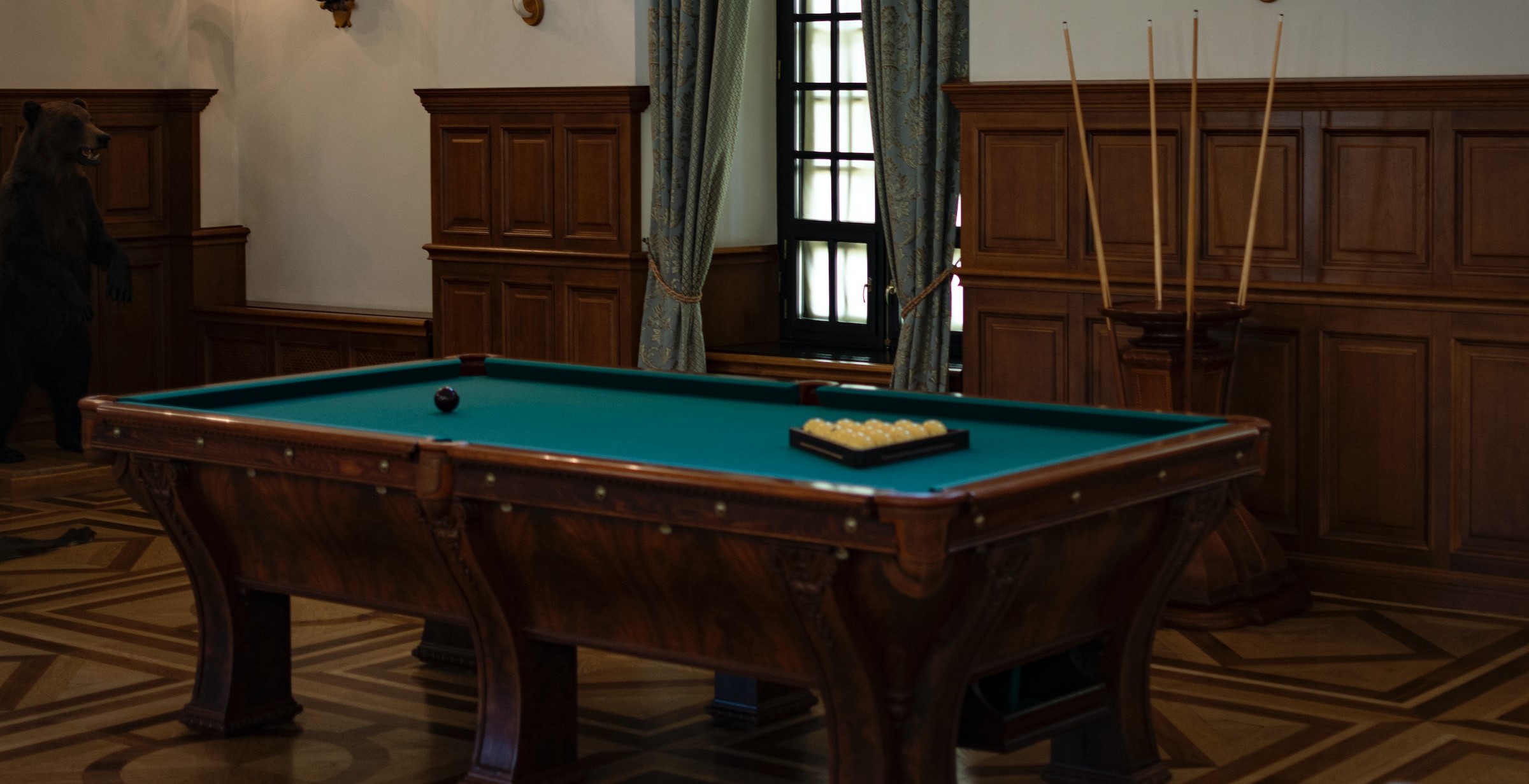
Determining the Ideal Pool Table Room Size
Choosing the right pool table is only half the battle; ensuring you have the right room dimensions is equally crucial. But how do you calculate the ideal room size? It’s not as simple as just measuring the table. There are several factors to consider:
Formula for Calculating Pool Table Room Size: At its core, a straightforward formula can guide most of your room size decisions: Table size + (2 x cue length). For standard play, a cue length is typically 58 inches, so you would add 116 inches (or 9.7 feet) to both the length and width of the table. This calculation ensures that players have adequate space on all sides for cueing without hindrance.
For instance, for an 8-foot table:
- Length: 8 feet + 9.7 feet = 17.7 feet
- Width: 4.5 feet (standard width) + 9.7 feet = 14.2 feet
Thus, for an 8-foot table, a room size of at least 18 feet by 15 feet is recommended.
Consideration for Additional Furniture: If you’re envisioning a full-fledged billiard room complete with seating, racks, or maybe even a mini-bar, you’ll need to account for this additional space. Add an extra 2-3 feet of clearance for any adjacent furniture to the aforementioned calculated room dimensions to maintain functionality and comfort.
Space for Player Movement: Beyond just the cue action, players need space to move, observe the table, and plan their shots. If you’re placing your table in a shared space or living area, ensuring there’s room for easy player movement becomes even more essential.
Shape of the Room: While the above calculations provide a good starting point, the shape of your room is also a key consideration. For instance, a long narrow room might meet the total square footage requirements but might not be conducive to gameplay due to its shape.
Determining the ideal pool table room size is a blend of mathematics, foresight, and a pinch of creativity. It’s always better to overestimate slightly than to find yourself restricted in space, especially when it comes to a game as spatially nuanced as pool.
Minimum Room Sizes for Different Pool Tables
While it’s always recommended to have more room than the bare minimum, it’s essential to understand the least amount of space needed to play comfortably. Using our earlier formula and standard cue lengths, let’s outline the minimum room dimensions required for different table sizes:
4-foot table: Given that a standard cue is approximately 58 inches (4.8 feet), the room dimensions for a 4-foot table should ideally be:
- Length: 4 feet + 9.6 feet = 13.6 feet
- Width: 2.5 feet (approximate width for this size) + 9.6 feet = 12.1 feet
Between 4 and 6-foot tables: Given the variability in size within this range, an average size of 5 feet is considered for calculation.
- Length: 5 feet + 9.6 feet = 14.6 feet
- Width: 2.75 feet (approximate average width) + 9.6 feet = 12.35 feet
6-foot table:
- Length: 6 feet + 9.6 feet = 15.6 feet
- Width: 3.5 feet (standard width for this size) + 9.6 feet = 13.1 feet
7-foot table:
- Length: 7 feet + 9.6 feet = 16.6 feet
- Width: 3.5 feet (standard width for 7-foot tables) + 9.6 feet = 13.1 feet
8-foot table (Standard Home Size):
- Length: 8 feet + 9.6 feet = 17.6 feet
- Width: 4.5 feet (standard width for 8-foot tables) + 9.6 feet = 14.1 feet
9-foot table (Tournament Size):
- Length: 9 feet + 9.6 feet = 18.6 feet
- Width: 5 feet (standard width for 9-foot tables) + 9.6 feet = 14.6 feet
Keep in mind that these dimensions are the minimum recommended sizes. If you have the luxury of space, opting for a slightly larger room can enhance the playing experience and provide extra comfort for both players and spectators.
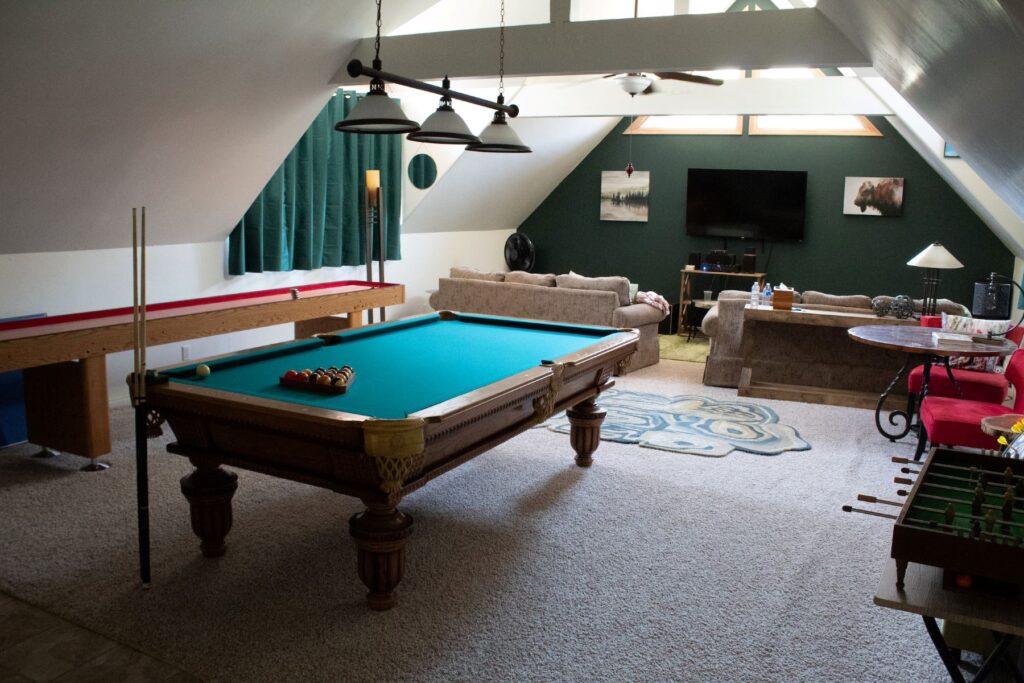
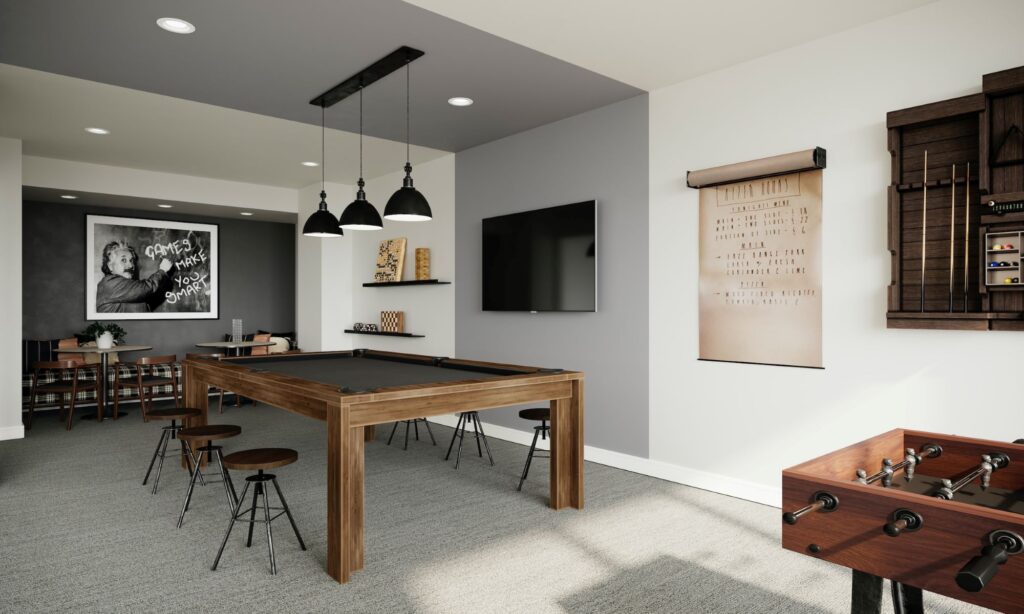
Other Factors to Consider
Even with the perfect room size in hand, there are other elements that can significantly impact the pool-playing experience. The ambiance, functionality, and overall vibe of the room play a huge role. Here are some additional factors to keep in mind when setting up your pool haven:
- Lighting: Proper illumination is crucial. A well-lit table ensures that shadows don’t interfere with gameplay. Consider installing overhead lights, preferably pendant or pool table-specific fixtures, that evenly distribute light across the table.
- Flooring: While many players might overlook this aspect, the type of flooring can make a difference. Hardwood or tiled floors can be durable and easy to maintain, especially when considering possible chalk stains or the occasional drink spill. Carpets provide a cozy ambiance but may need more frequent cleaning.
- Wall Decor: Think about the aesthetic of the room. Hanging vintage pool posters, framed rules, or even action shots can enhance the atmosphere. However, ensure wall decorations don’t impede player movement or distract from the game.
- Acoustics: The sound of balls colliding is a significant part of the pool experience. Rooms with very high ceilings or those that are too open might diffuse this sound. Consider adding some soft furnishings or acoustic panels if the room’s sound feels too hollow or echoing.
- Ventilation: Playing pool can be intense! Ensure the room has adequate ventilation or a fan to keep the air fresh, especially if you’re planning on hosting extended game nights.
- Storage: Where will you store cues, balls, chalk, and other accessories? Incorporating a wall-mounted cue rack or dedicated shelving can keep everything organized and within reach.
- Seating: If you’re likely to have friends over for games or tournaments, consider adding comfortable seating around the room. This not only makes the room more inviting but also ensures spectators have a place to relax and watch the game.
- Space Flow: Consider how players will move around the room. Is there a natural flow? Are there obstacles in the way? A good layout promotes ease of movement and enhances gameplay.
- Windows and Sunlight: While natural light is always a boon, direct sunlight can fade the felt of a pool table over time and create unwanted glares. If your room has large windows, consider adding blinds or curtains to control the amount of sunlight that comes in.
Setting up the perfect billiard room isn’t just about the table and space. It’s about creating an environment that complements the game, enhances the experience, and brings joy to everyone who steps into the room.
Tips for Small Spaces
Not everyone has the luxury of a sprawling game room, but that doesn’t mean you can’t enjoy a great game of pool. Small spaces can be both challenging and rewarding to design. Here are some practical tips to make the most out of limited room dimensions:
- Opt for a Smaller Table: As discussed earlier, tables come in various sizes. For tight spaces, consider going for mini, small, or even the 6-foot recreational tables. They still offer a genuine pool experience but are more accommodating to restricted areas.
- Foldable/Convertible Tables: Consider investing in a foldable pool table, which can be packed away when not in use. Alternatively, some tables convert into dining tables, offering dual functionality and maximizing space efficiency.
- Wall-mounted Storage: Use vertical space to your advantage. Instead of floor racks, mount cues, balls, and accessories on the wall. This minimizes the floor footprint and keeps essential items within reach.
- Multi-functional Furniture: Think about using benches instead of individual chairs for seating. Benches can be easily tucked away and can also offer storage options underneath.
- Strategic Lighting: In small spaces, a huge pendant light might feel overwhelming. Opt for adjustable, wall-mounted lights or slim profile overhead fixtures that adequately illuminate the table without making the room feel crowded.
- Mirrors: A classic design trick to make spaces feel larger is to use mirrors. A well-placed mirror can visually double the room’s size, giving an illusion of a more expansive space.
- Declutter: Keep the room simple and free from unnecessary items. A minimalist approach not only makes the space feel bigger but also ensures that players aren’t distracted by clutter.
- Opt for Light Colors: Lighter wall colors and floor finishes can make a room feel airy and spacious. Darker tones might feel cozy, but they can also make the room feel more confined.
- Flexible Layout: If you occasionally need more space for specific games, ensure your furniture is light and easy to move. This flexibility can temporarily create more room when needed.
- Consider Room Dividers: If your pool table is in a multi-purpose room, think about using foldable dividers. This allows you to create a dedicated pool area when playing and then open up the space when done.
While working with small spaces can be challenging, it’s also an opportunity to be creative and innovative. With thoughtful planning and design, even the coziest rooms can become the perfect spot for a thrilling game of pool.
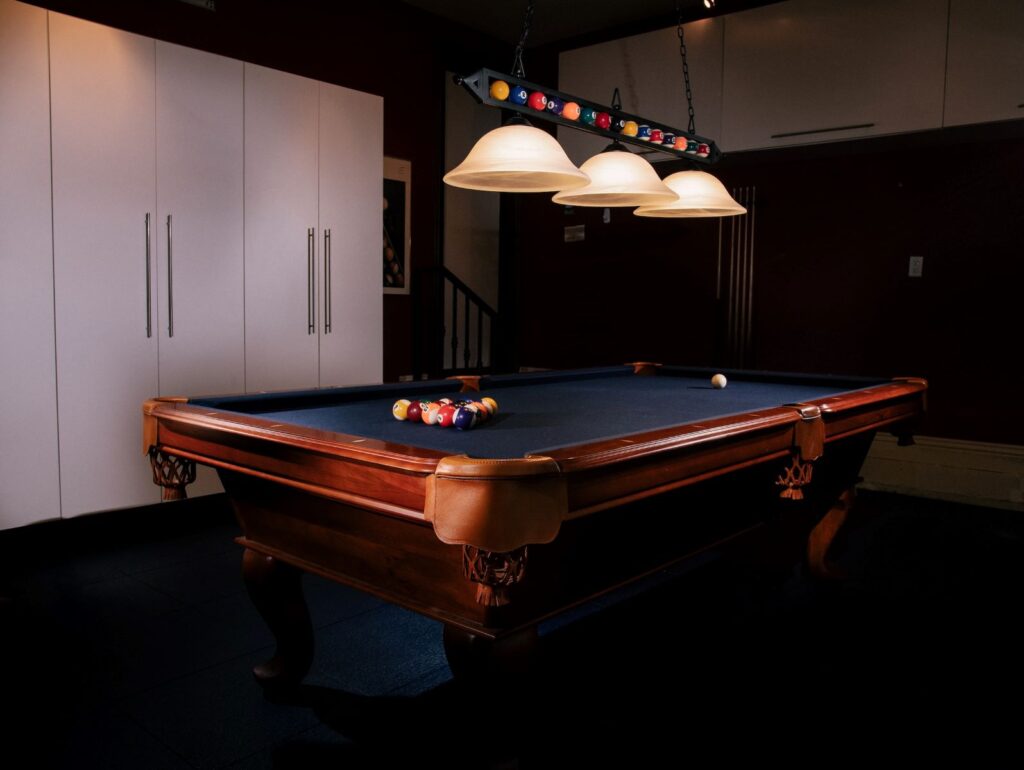
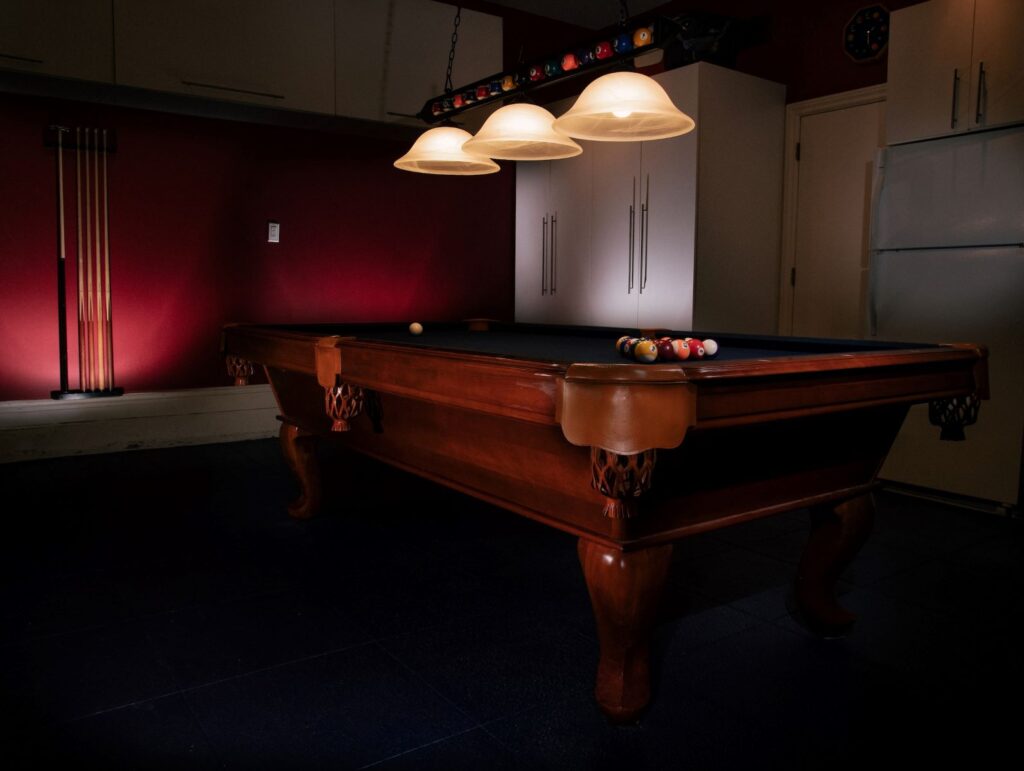
Enhancing Your Pool Room
Once you’ve ensured that your pool room meets all the functional requirements, the next step is to elevate its ambiance and aesthetics. An enhanced pool room can not only improve gameplay but also offer an immersive experience for both players and spectators. Here are some ideas to consider:
- Theme It Up: Whether you love the vintage charm of old billiard parlors or a more modern, sleek look, choosing a theme can set the mood. Some popular themes include retro, industrial, luxury, sports bar, and rustic.
- Artistic Cue Racks: A cue rack doesn’t have to be just functional; it can be a piece of art. Consider racks that have intricate designs, or are made of luxury materials. Custom designs can be a unique reflection of your personal style.
- High-Quality Sound System: A soft background soundtrack or even the ability to play commentary during a tournament can enhance the pool playing experience. Invest in a sound system that provides clear, rich sound without overwhelming the room.
- Interactive Scoreboards: Digital or chalk-based scoreboards can add a fun and competitive element to games. They also help keep track of scores during tournaments.
- Comfy Seating: If space permits, consider adding plush armchairs or even a sofa. It provides a comfortable space for players to relax between games or for spectators to enjoy the match.
- Drink Holders and Mini Bar: Keep refreshments close by with built-in drink holders or a compact mini bar. It prevents spills on the table and ensures players stay hydrated.
- Greenery: A touch of green can breathe life into any room. Consider adding a few indoor plants or even a vertical garden if wall space allows. They not only enhance the ambiance but also help improve air quality.
- High-Quality Felt: The felt on your pool table isn’t just functional; it can be a design statement. Consider vibrant colors or custom designs that match your room’s aesthetic. Read our guide about pool table felt here.
- Personal Touches: Personalizing your pool room can make it truly special. This could be through custom wall art, memorabilia from famous matches, or even framed photos of your own pool victories.
- Ambient Lighting: While functional lighting is crucial, ambient lighting can set the mood. Consider adding LED strips, lanterns, or even a fireplace for those who want to combine luxury with coziness.
- Technology Additions: From smart lighting controls to projectors for watching major tournaments, infusing technology can make your pool room state-of-the-art.
While it’s great to enhance your room with these additions, always prioritize comfort and functionality. A well-designed pool room should not only be visually appealing but also promote the best gameplay experience.
Common Mistakes to Avoid
Setting up the perfect pool room is a combination of preparation, knowledge, and creativity. However, even the best-laid plans can go astray. To ensure you’re on the right path, here are some common mistakes you should steer clear of:
- Underestimating Space Needs: One of the biggest errors is not accounting for cue space around the table. Always consider the total room size, including extra space for the cue’s full extension and player movement.
- Improper Lighting: A pool table that’s poorly lit can hinder gameplay and strain the eyes. Ensure the entire table is uniformly illuminated, avoiding shadows or overly bright spots.
- Overcrowding the Room: While it’s tempting to add seating, decor, and other amenities, it’s essential to strike a balance. An overcrowded room can restrict movement and detract from the main attraction – the pool table.
- Ignoring Room Flow: Ensure there’s a logical flow to the room. Players shouldn’t have to navigate around furniture or other obstacles when moving from one shot to the next.
- Neglecting Acoustics: Hard surfaces can create echoes, which might be distracting. Consider adding rugs, wall hangings, or acoustic panels if necessary.
- Choosing Style Over Function: While aesthetics are essential, functionality should always come first. A beautifully designed cue rack that doesn’t securely hold your cues, for example, isn’t a good choice.
- Poor Quality Accessories: Skimping on items like cues, balls, and chalk can impact gameplay. Invest in good quality accessories that enhance the game and last longer.
- Forgetting Ventilation: Especially in basements or enclosed spaces, it’s easy to overlook ventilation. Ensure there’s adequate airflow to keep the room comfortable.
- Positioning Near Windows: If your table is near a window, direct sunlight can fade the table felt over time. Moreover, temperature fluctuations near windows can affect the table’s wood and leveling.
- Not Planning for Storage: Pool requires various accessories. Not having a dedicated space for these can lead to clutter, potential damage, or misplaced items.
- Ignoring Maintenance: Once everything is set up, regular maintenance is key. Cleaning the felt, ensuring the table is level, and periodically checking cues and balls for wear will keep your game room in top shape. Read our pool table maintenance guide.
While setting up your pool room, always keep in mind the primary purpose: to enjoy the game. Ensuring a balance of form, function, and fun will help you create a space that’s both beautiful and conducive to a great game of pool.
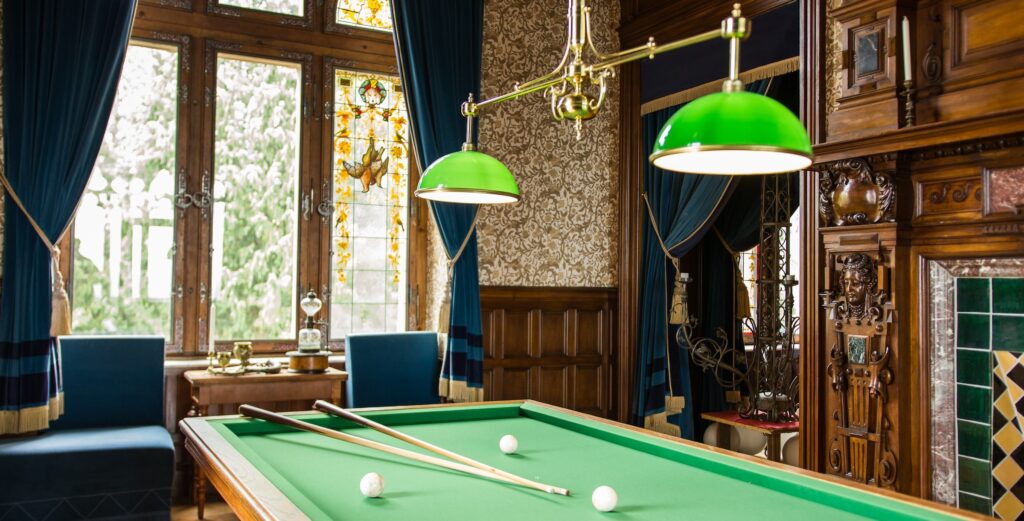
Frequently Asked Questions (FAQs)
Setting up a pool room often comes with a barrage of questions. Here are some commonly asked questions and their answers to help you in your journey:
Do I need to consider pool table room size if I’m only playing casually?
Absolutely. Whether you’re playing casually or professionally, the room size impacts the quality of the game. Adequate space ensures unrestricted movement and an authentic pool experience.
Can I place my pool table on the carpet?
Yes, you can. However, it’s crucial to ensure that the table remains level. Over time, the weight of the table might create impressions on the carpet, which could require re-leveling.
How often should I change the felt on my pool table?
This largely depends on usage. For tables used regularly, it’s recommended to change the felt every 2-3 years. For less frequent use, it can last up to 5 years or more. Always check for signs of wear or pilling.
Does humidity affect my pool table?
Yes. High humidity can cause the wood to swell, potentially warping the table or affecting its level. It’s essential to maintain a stable environment, possibly using dehumidifiers if necessary.
Is it necessary to have a professional set up my table?
While some enthusiasts opt for DIY setups, having a professional handle it ensures the table is level, the felt is correctly stretched, and the overall setup is optimized for gameplay.
Can I move my pool table once it’s set up?
It’s possible, but not recommended without proper knowledge. Moving it can affect its level and even damage the table. If you must move it, consider seeking professional assistance. Read our guide here.
How do I protect my pool table from sunlight?
Use blinds, curtains, or UV protective films on windows to reduce direct sunlight exposure. This not only protects the felt but also prevents the wood from fading.
Is overhead lighting mandatory?
While it’s not mandatory, overhead lighting provides consistent and shadow-free illumination, which is ideal for pool gameplay. Wall lights might not offer the same uniformity.
How can I maintain the level of my table?
Regularly check the level using a carpenter’s level. If adjustments are needed, tables usually have adjustable feet or shims can be used. If unsure, consult with a professional.
Do temperature fluctuations affect the game?
Yes, they can. Extreme cold can make the felt slower, while heat can make it faster. Consistent room temperatures offer the most consistent gameplay.
The key to a fantastic pool room is preparation and knowledge. The more informed you are, the better decisions you’ll make, leading to countless enjoyable games ahead.
Conclusion
Determining the right pool table room size is just the tip of the iceberg when creating the ideal game space. From the table’s dimensions to room aesthetics, each aspect plays a pivotal role in enhancing the overall pool playing experience. While the process might seem overwhelming initially, taking it step by step, and considering both the practicalities and personal preferences, will ensure you craft a space that’s not only functional but also resonates with your style and personality.
Remember, a well-designed pool room is more than just a space for a table; it’s a sanctuary for relaxation, friendly competition, and creating cherished memories with loved ones. Whether you’re a novice just dipping your toes into the world of pool or a seasoned player with a passion for the game, the right environment can elevate your experience manifold. Here’s to many thrilling games and unforgettable moments in your perfectly crafted pool room!